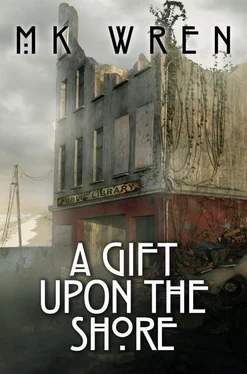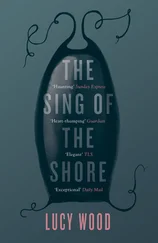My pain alarms Stephen, but I go on: “Rachel said civilization is the highest expression of the human mind. At least, it had the potential for that because it could free people of the drudgery of survival and provide the tools and knowledge that make comprehension and creativity possible. The trouble is, homo sapiens bring a lot of primitive genetic baggage into the world along with our wonderful new cerebral cortexes. We’re social animals with instinctive needs to establish dominance hierarchies. We’re territorial and xenophobic and, like any organism, programmed to reproduce, and we did it compulsively and irrationally. And that’s what destroyed the golden age, and with it all the art and poetry, all the discoveries and insights accumulated over the last ten thousand years.”
Did Rachel really say that? Yes. Many times. But not in those words. The words are mine. Stephen’s narrowed eyes tell me he’s thinking about what I’ve said. He isn’t sure what it means yet, and he silently waits for me to go on.
“Rachel knew even then that our civilization was lost. In this hemisphere, at least. But I still clung to the hope that remnants of it had survived. I was convinced that if we went east beyond the Coast Range, or north or south along Highway 101, we’d find people. Civilization. On the first anniversary of the End, we talked about a journey in search of survivors, but there was still too much to do to prepare for winter. Besides, we were exhausted, and I was afraid we’d end up sick. And at that time we couldn’t have gone south . There were a lot of lightning storms that summer, and on September fifteenth we saw the smoke from a huge forest fire to the south. We watched it for days. The wind was from the north, so we weren’t in its path, but the smoke covered half our sky. It rose in an immense cloud like a thunderhead, the color of opal where it was thickest. Strange, how many destructive things are so beautiful. Even the cloud of a nuclear bomb was beautiful.”
Startled, Stephen asks, “Did you see such a cloud?”
“No, I never actually saw one. I saw pictures of them. Anyway, we decided we couldn’t go south or any direction that fall. We had the winter to think about.”
Stephen cups his chin in one hand. “Was the second winter as hard as the first?”
“No, or we wouldn’t have survived it.” I skim more pages in the diary. “But it wasn’t an easy winter, and we were on short rations. We both lost a lot of weight. In December Shadow gave birth to another litter of puppies. And every evening Rachel spent at least an hour sorting and reading the books she’d scavenged, and I… well, I was always too busy or too tired for that. I think I even resented it, really, although I never said anything to her. I closed my mind to the books.”
“You, Mary?” Stephen studies me dubiously. “But you love books so much. And you said—well, when you first saw Rachel’s books, that’s when you knew you’d found a kindred soul.”
“Yes.” I run my fingers over the cover of the Emily Dickinson. It was one of Rachel’s books. “I had always loved books, Stephen. I learned that from my parents. But after the End… I didn’t understand it till later, but it was as if the books didn’t exist for me, and I didn’t even wonder about that.” Then I turn again to the diary. “At any rate, we did have snow that second winter, but it melted by the middle of January, and it was almost a normal spring for the coast. There were more birds. More insects, too, and many more slugs. But the garden thrived in spite of them. So did the livestock, and in May Silver gave birth to a colt, a bay filly. We called her Epona. The rabbits and chickens did well, and the bees recovered enough so that by late summer we took a good harvest of honey and wax. That’s when we learned to make candles, although we still had some kerosene and whale oil.” I close the diary and look out through the rain curtains at the gray sea.
“The most encouraging thing was to see the ocean rejuvenated. The tide pools filled with life again, and barnacles and mussels began colonizing the rocks. We saw a few salmon in the Coho and even whales spouting on their way north. Every sign of recovery was a miracle to us. Some of our crops and animals died, others lived. Two of Shadow’s pups died, but two lived. And we lost another cat. That left only Mehitabel, a lone female.”
And I remember how I sympathized with her. I thought a great deal that year about being a female without a male. For all I knew, our species was near extinction, and I could do nothing to save it. I had no doubt I was capable of it; my menstrual cycles continued with frustrating regularity. Sometimes I saw Rachel and me as two Eves in a precarious Eden born of Armageddon.
I’m reminded that I’ve lapsed into silence when Stephen asks, “Did you and Rachel ever go to look for other people?”
“Yes, but not until late summer. By then we’d harvested the crops and put up the hay, and the animals born that year were old enough to fend for themselves. Still, we decided we couldn’t leave any of the animals for more than three weeks. We fortified the rabbit hutches and the chicken house and pigpen, and rigged water tanks and food bins that would hold enough to last that long.” I leaf through the diary, seeking the entry marking the beginning of our trek, but pause before I reach it, distracted by another entry.
“I made a note on August twentieth, Stephen. We saw an odd, brown cloud in the east over the mountains. Actually, we’d seen similar clouds earlier, and at first we thought they were smoke from forest fires, except the color was wrong. We learned the answer to that puzzle on our trek—one of the many hard lessons we learned. Anyway, on… here it is. On the last day of August we set off on our odyssey: two women, two dogs, and two horses loaded with food and camping gear. I remember worrying about the animals we left behind, but once we turned east on the Portland highway, all I could think about was what lay beyond the Coast Range. Or what I hoped…” My throat closes on the words. Stephen watches me; he seems to be holding his breath.
Finally I say, “First, you have to understand what that land was like Before. The Willamette Valley. A huge trough running north and south, a hundred miles wide, bracketed by the Coast Range on the west and the Cascades on the east. Oh, Stephen, it was so beautiful. Gentle hills and dark earth, wheat and hay fields bright green in the spring, and in the summer dotted with bachelor’s buttons, and at harvest time, they were like golden seas. Wild roses grew along the fences, and the orchards—some of them had thousands of fruit or filbert trees, and when they bloomed, they were glorious. You’d see hawks soaring over fields of strawberries and clover, and between the fields there were stands of firs and groves of oaks with their limbs frosted with moss. The rivers were wide and slow and deep green, and there’d be fishermen at almost any bend.”
Stephen is rapt, and I might as well be describing Oz. It is, in fact, a fantasy now.
“The biggest cities in the state were in the Willamette Valley, Stephen. Portland, which was a major seaport, even if it was so far inland. The ships came up the Columbia River. And Salem, which was the capital of the state. And they were targets for those reasons.”
He tilts his head, brows drawn. “Targets?”
“Targets for the bombs. I knew they would be, and I didn’t expect anyone to have survived in the cities themselves. But I thought somewhere in the Valley we’d find… some remnant of civilization.”
“But you didn’t.” It isn’t a question.
“No. I hadn’t counted on the firestorms from the bombs and the effects of the nuclear winter and the Blind Summer. What we found east of the divide of the Coast Range was a desert. A charred, dry wasteland. All the trees had burned. The river that flowed by the highway was brown. Every field was cracked and gouged with gullies. Only a few sprigs of grass and lupine tried to root there. It was a gray, silent place where no insects buzzed, and birds didn’t live to sing, and the only thing that moved was whirlwinds of dust.”
Читать дальше












